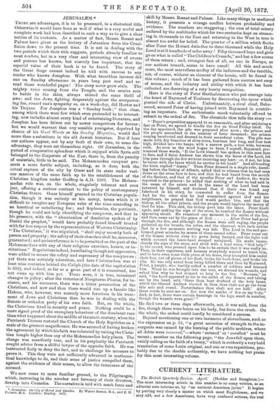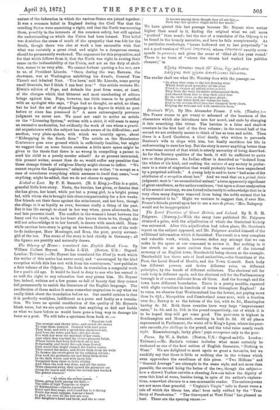CURRENT LITERATURE.
The British Quarterly Review. April. (Hodder and Stoughton.)— The most interesting article in this number is an essay written, as an editorial note informs us, by "an eminent American jurist." It begins by putting very clearly a matter on which most Englishmen, and we may add, not a few Americans, have very confused notions, the real
nature of the federation in which the various States are joined together. It was a common belief in England during the Civil War that the seceding States were exercising a right, and that the North was coercing them, possibly in the interests of the common safety, but still against the understanding on which the Union had been formed. This belief was doubtless the cause of mach of the sympathy that was felt for the
South, though there was also at work a less excusable wish that what was certainly a great rival, and might be a dangerous enemy, should be permanently weakened. The argument for this proposition, and for that which follows from it, that the North was right in resting their cause on the indissolubility of the Union, and not on the duty of aboli- tion, seems to us very able. We cannot forbear quoting a bon mot, new to us, of President Lincoln. "Once, during the war, Barnum, the showman, was at Washington exhibiting his dwarfs, General Tom Thumb and Admiral Nutt. You have,' said Mr. Lincoln, some pretty small Generals, but I think I can beat you.' " One article reviews Mr. Elwin's edition of Pope, and defends the poet from some, at least, of the charges which that bitterest and most unrelenting of editors brings against him. Pope, however, has little reason to be gratified with an apologist who says, " Pope bad no thought, no mind, no ideas, but he had the art of rhymed language in a degree in which no poet before or since has possessed it." A more extravagantly perverse judgment we never saw. We must not omit to notice an article on the "Licensing System," written with a strict, it will seem to many an excessive moderation, but evidently the work of one whom a practi- cal acquaintance with the subject has made aware of its difficulties ; and another, very plain-spoken, with which we heartily agree, about "Kidnapping in the South Seas." The article on the Manchester Conference goes over ground which is sufficiently familiar, but might we suggest that on some future occasion a little more space might be given to the thesis that there is no wrong in compelling a parent to send his child to a purely secular school? As at present instructed, this present writer, sooner than do so, would suffer any penalties that these strange friends of religious liberty might choose to inflict. " We cannot require the Legislature," calmly says our writer, " to accept as a case of conscience everything which assumes to itself that name,"—or anything, might be added, that we do not choose to approve.



































 Previous page
Previous page